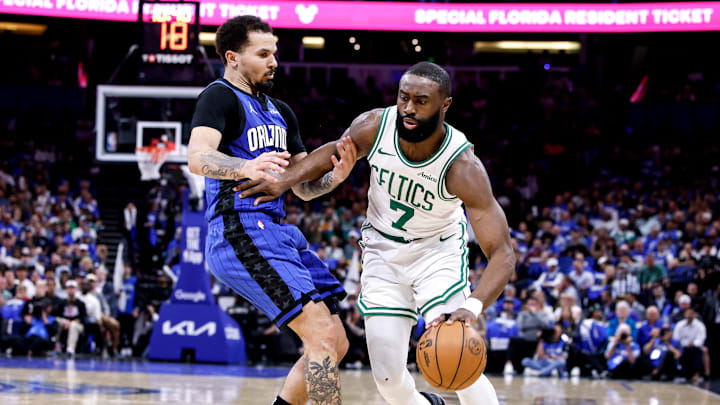ORLANDO — This season—a stretch that included 61 wins, the all-time three-point record, and three individual players snapping the franchise record for made threes—the Boston Celtics dominated from behind the arc. Throughout all 82 games, they never attempted fewer than 30 threes in a game.
In Game 3 against the Magic, they only took 27.
Though the Celtics made history with threes this year, that’s never been the point of their offense. “I don't love threes, I love great shots,” Joe Mazzulla said after a win over the Philadelphia 76ers on February 27, 2024, in which the Celtics only attempted 22 three-pointers.
Yet the Magic seem intent on taking those shots away. They’re pressing up on screens, playing physical off the ball to take away movement, and sticking like glue to anyone standing behind the arc.
The Magic are taking away Celtics threes (and they keep doubling down)
This has been their philosophy all series. Boston only took 37 threes in each of the first two games, which is well below their season average of 52.6. But in Game 3, the Magic took their defense to another level.
Boston fell just two points short on Friday night as the Magic brought the series to 2-1, but their lack of a three-point threat was palpable.
“They're denying off-ball,” Payton Pritchard said on Sunday morning in Orlando. “They're kind of allowing guys to play more one-on-one ball on an island, and taking away catch-and-shoot threes and stuff like that. If you can tell, they're denying off in the corners and stuff like that. So, that means we probably got to take it to the rim, be efficient in that area.”
Oftentimes, when the Celtics’ three-point attack gets muffled, they will turn to the paint. But Orlando’s physicality has mitigated that option. Kristaps Porzingis has been rendered effectively useless on offense through the first three games, and anytime Jayson Tatum or Jaylen Brown have driven to the paint, they’ve been subjected to body checks, swiping hands, and big-bodied contests.
That’s the identity Orlando has crafted for itself. They’ve successfully pushed the limits of what the refs will and won’t call fouls, and it’s completely taken the Celtics out of their rhythm.

Tatum and Brown turned the ball over 13 times in Game 3, the Magic snagged 15 offensive rebounds, and outside of the restricted area, the Celtics shot just 16-of-53 (30.1%) from the field.
Orlando is employing the inverse of Mike Budenholzer’s strategy. Rather than protecting the paint at all costs, Jamahl Mosely is protecting the arc at all costs—and it’s working.
Now, it’s up to the Celtics to find a way around it.
“Continuing to execute our offense,” Al Horford said of how the Celtics can find quality shots when Orlando is taking away the three-point line. “Have to make sure that we do a good job executing offensively, getting to our spots, and taking advantage of those shots when we get them.”
“Different ways,” Pritchard said. “Definitely off-ball screening. Off-ball movement.”
Mosley’s Magic found something in Game 3. Offensively, they’ve been a disaster all season. Through the first three games of this series, they’ve only mustered up 100 points one time. But that didn’t matter on Friday night.
Their physicality and willingness to double down on their defensive strategy forced the Celtics to falter from behind the arc. But they also took away the rest of their offensive options.
In Game 1, Derrick White exploded for 30 points, and he and Pritchard rained down threes. Since then, Orlando took their long-range shots away. In Game 2, Brown put on a master-class performance, dissecting the Magic with drives and middys. The following game, foul trouble limited Brown’s effectiveness, and he was held to just 14 shot attempts.
Orlando’s half-court offense has been miserable. So, instead of trying to find ways to improve it, they’ve focused elsewhere. Their physicality turned the Celtics over 19 times. They furiously attacked the glass. They prevented Boston’s three-point offense from getting off the ground, but at the same time, they played straight-up defense elsewhere to limit the Celtics’ other options.
Boston has the talent to find ways around Orlando’s chess-match defense. But when the rooks and pawns are throwing elbows, a little more creativity is needed.
